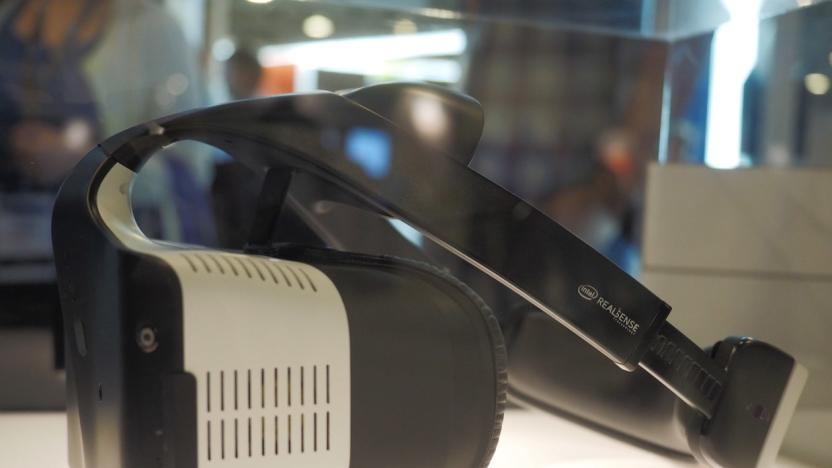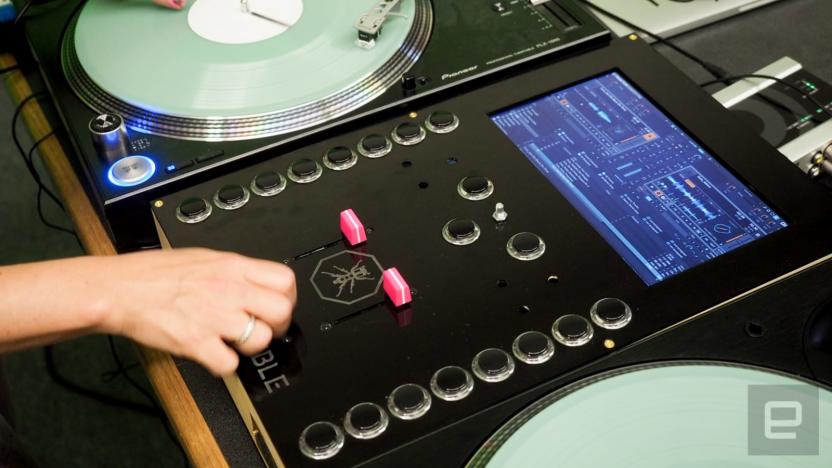idf2016
Latest

Watch Segway's personal robot in action
What if you could have a personal robot helper that transforms into a self-balancing scooter? That's the appeal of the Segway Robot, an adorable device which first debuted during CES. We were able to take a close look at it this week during Intel's Developer Forum in San Francisco, and while it's clearly a prototype (it doesn't even have an official name yet), it still has plenty of potential. Above, check out our interview with Sarah Zhang, senior director of robotics business operations at Ninebot and Segway, who dives into what makes this little bot so special.

Smart glasses make hands-free 'Pokémon Go' a reality
Pokémon Go has taken the world by storm. It's not uncommon to see dozens of people walking around parks and city streets with their heads buried in their phones, trying to catch cute cartoon monsters. Unfortunately, doing so means you're not keeping your eyes on the road, which has already led to a few accidents. But what if you could somehow play Pokémon Go while also paying attention to the world around you? That's exactly what Recon has attempted to do by porting the popular game over to the Jet, a pair of Android-based smart glasses the company released last year. The setup isn't perfect and it doesn't work completely just yet, but even what I've seen so far provides an exciting glimpse at the next wave of augmented reality.

Intel's Joule is its most powerful dev kit yet
We've seen plenty of unique dev kits from Intel, including the SD card-sized Edison, but not one as powerful as this. Today Intel announced Joule, a tiny maker board that will allow developers to test RealSense-powered concepts and, hopefully, bring them to market faster than before. The company says the tiny, low-powered Joule would be ideal for testing concepts in robotics, augmented reality, VR, industrial Internet of Things, and a slew of other categories. And it also looks like it could be an interesting way for students to dabble in RealSense's depth-sensing technology in schools.

Intel's Euclid is a RealSense PC the size of a candy bar
Intel has just announced Euclid, a unique all-in-one RealSense device that's packed in the size of a candy bar. As CEO Brian Krzanich said on stage at the Intel Developer Forum keynote, this is essentially an easy way to bring sensors to any robot. The Euclid packs in a camera, an Atom processor, onboard communications, a battery and even a self-contained PC running Ubuntu Linux and Robot OS. Think of it as a robotics platform you can put in your pocket.

Windows Holographic coming to all Windows 10 PCs next year
We already knew that all Windows 10 PCs will be compatible with Windows Holographic, a "mixed reality" experience that'll let you immerse yourself in faraway lands. Now, we know when that will be. Terry Myerson, Executive VP of Microsoft's Windows and Devices group, just came on stage at the Intel Developer's Forum to announce there will be an update to Windows 10 to add the holographic shell update as soon as next year.

Intel shows off Project Alloy, an all-in-one VR headset
Moving one step beyond Samsung's Gear VR, Intel just announced Project Alloy, an all-in-one VR headset that doesn't need to be connected to a phone or computer. Yes, that means it's completely wireless, with its own processor and battery. Alloy can also track rooms on its own, and it tracks your fingers for interacting with virtual objects. There's also a camera that lets you see other objects in the room, as well as nearby people. It's part of Intel's push around "merged reality," which combines VR and augmented reality into a single cohesive experience.

Thud Rumble's Intel-powered DJ mixer has a PC inside
Roughly four years ago, Thud Rumble -- a company that's the brainchild of legendary DJ QBert (Richard Quitevis) and Yogafrog (Ritche Desuasido) -- was having an open house. Developer and DJ Rich Johnson (aka DJ Hard Rich) wandered in to talk to the co-founders. During a conversation with Quitevis, Johnson said, "I want to make a mixer for you guys." Quitevis had long wanted a mixer with an embedded computer so he wouldn't have to drag a laptop and mixer to gigs. "Can you make something like this?" he asked. Johnson said he could. Finally they're showing it off.

Intel's Apollo Lake chips promise slimmer, beefier budget PCs
Intel's Atom-based processors have gotten much better at delivering a lot of bang for the buck, but there's still little doubt that you're using a low-cost system. PCs like HP's Stream series still tend to be thick, carry a meager amount of RAM and rule out intensive tasks like 4K video. You might not have to make quite so many sacrifices going forward, though: Intel has offered a peek at Apollo Lake, a next-generation system-on-a-chip that promises to inject some life into the budget category. It's not only more compact, but efficient enough that PC makers can afford to slim things down without as many compromises -- they can use smaller batteries without hurting battery life, for instance. The more inclusive design (should also save several dollars (around $5-7) in parts that can be rolled into more RAM, better displays and similar upgrades.



